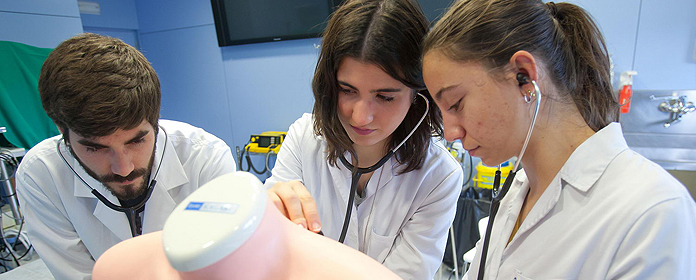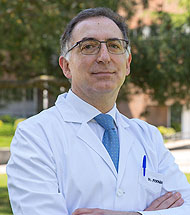2020_05_25_MED_nuevo_grado_medicina_harvard
The University launches a new Degree in Medicine with the advice of Harvard.
The degree scroll is framed in the strategic project for 2020-2025 and adopts the international standards of the World Federation for Medical Education .


The School of Medicine of the University of Navarra launches a new Degree in Medicine in September 2020, in the framework of the project strategic UNIC (University of Navarra Curriculum Integration). This strategy, elaborated in partnership with academic staff of Harvard Medical School and following the international standards of the World Federation for Medical Education, determines the lines of action of the School for the period 2020-2025.
The new Degree in Medicine, the backbone of project, involves the complete renovation of Study program, new teaching methodologies and assessment and the reinforcement of practical classes. It also includes the possibility of studying for a full year in Madrid.
This new degree scroll emphasizes curricular integration, which allows students to understand and acquire knowledge in context. "The training plan focuses on the study of the various Basic Sciences (Biochemistry , Genetics, Anatomy or physiology, among others) always from a clinical perspective and oriented from the first course to the medical internship ", details Dr. Secundino Fernandez, Dean of the School. "It thus strengthens the main goal that our School has: to train doctors with a solid theoretical preparation and internship, and trained to pass the requirements or access exams to residency program in any country in the world."
It will begin to be implemented in September with first-year students. In addition, it will make it possible to comply with the requirements to obtain the accreditation with which all the Schools of Medicine in the world must have by the year 2023. Otherwise, graduates of Schools not accredited will not be able to do the specialization program or work in the United States, among other countries.
Clinical internships from the first yearThe new Degree will increase the training internship of the students, which will start from the first year of degree program. Students will have a third year of training exclusively internship (rotating), which they will be able to complete in Pamplona or Madrid. They will perform rotations in the essential clinical Departments for the training of a physician: Internal Medicine, General Surgery, Psychiatry, Pediatrics, Gynecology and Obstetrics and Primary Care.
In Pamplona, the internships will be carried out at Clínica Universidad de Navarra, the Navarra Hospital Complex, the García Orcoyen Hospital, the San Miguel Clinic, the San Juan de Dios Hospital and the Primary Care centers. In Madrid, the reference letter hospital will be the Clínica Universidad de Navarra.
In the fourth and fifth years, students will perform clinical internships in other medical areas of their choice, while taking the planned medical-surgical subjects. The sixth year plan will allow students to carry out a complete and integrated review of the knowledge acquired throughout the degree program. At the same time, the training internship in this last year is intended as an introduction to specialization, where the student will have to assume a role comparable to that of an inexperienced resident physician (or Pre-spanish medical residency program).
Bimonthly, new methodologies and facilitiesThe strategic project of the School of Medicine also involves implementing changes in the academic calendar, new systems of assessment and the adaptation of new facilities in the campus of Sciences. Starting in September, the course will be organized in bimesters, during which students will focus on 2 or 3 subjects that will be examined afterwards.
"This measure is intended to reduce the dispersion of content and an orderly concatenation of subjects for integrated and progressive learning," says Arantza Campo, vice dean of Office of Academic Affairs and manager academic of project. "This new calendar will allow students to finish their last year of degree program almost 2 months in advance with respect to the current plan, time that they can dedicate to the preparation of spanish medical residency program, the USMLE (equivalent exam to spanish medical residency program in the U.S.) or other entrance exams to residency program".
The Study program will widely extend new teaching techniques, some of which are already present in the current Degree , such as problem-based learning, in teams, case discussion, simulation or the advanced role in clinical practices. For this purpose, the project includes three state-of-the-art teaching laboratories and four classrooms that will allow the use, in addition to the masterful class , of methodologies of work in small groups and oriented to interactive learning. Generally these methodologies are based on the model of reverse class (the student prepares it), a dynamic in which the work of certain learning processes is transferred outside the classroom and uses the time of class, together with the experience of the professor, to enhance the acquisition and internship of other knowledge.
The systems of assessment have also been enriched, with the goal of not linking exclusively the assessment with the grade, but offering students tests or self-evaluations that have a mainly formative purpose.

